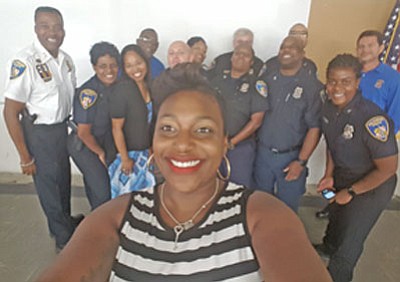BALTIMORE — This is Part 111 of a three part series about Community Policing
When I walked into a community meeting in Harlem Park one night for a story I was working on, I stumbled across a story about the Baltimore City Police Department that didn’t make national news.
I didn’t expect to be welcomed into the circle of police officers, citizens and members of the city’s clergy, standing hand-in-hand under the sound of Baltimore City Police Chief Melvin Russell’s voice. They had gathered to pray..
Chief Russell’s words stirred my soul with such conviction, that I had to meet him. I was expecting to shake his hand after the meeting adjourned. Instead, he greeted me with a warm hug and introduced me to his right hand, Det. Quinese Green, who gave me the story behind the BPD’s Faith-Based Program, an initiative of the department’s Community Collaboration Division focused on bridging the relational gap between police officers and members of the community.
“Without prayer the city won’t change,” said Green. “We deal will all denominations of religions but the one thing that they have in common is prayer. They all pray. Everybody, may not be a believer, but when times get hard they turn to the church. They look for spiritual guidance. They turn to their faith based entities for help.
“In order for the eastern district to transform [churches] are going to all have to come out from the confines of their congregations and come together,” she said of the program’s origin on Baltimore’s east side.
The BPD’s Faith-Based Program was developed from the spiritual premise that prayer or mindful meditation, hanges things. In the beginning, Chief Melvin Russell, the program’s visionary, and a member of the clergy himself, sent out a call to action to religious leaders in Baltimore to reach beyond the pews of the church to share the ineffable message of faith with people who may not ever step in a church or subscribe to a regligious affiliation.
At the time, 80 clergy members joined his efforts, according to Green, to fight crime and restore community relations in the Eastern Distrct.
“After a year or two, crime in the district reached an all-time low,” Green said. “And everybody wanted to know how he did it.. All he did was encouraged the faith-based community to do their part. He got everybody to work together to get whatever projects that were on the table done. It was a set up where communities organizations, churches, and schools would get the memo so that we could jump in front of and flesh out, any crime problems together, before they snowballled. It came easy.”
That was 2008. Today, the mission to heal the heart of the city continues to expand. As officer-in-charge, Det. Green manages the day-to-day operations of the faith-based Program. One of her main tasks is to recruit civilian chaplains and organize training for them at the Community Collaboration Division’s civilian chaplain academy, where faith-based leaders learn the basics of law enforcement and community policing through a series of rigorus workshops and riding alongs with officers on call. This training, Green says, prepares them to fulfill their purpose to the BPD. Upon graduation, civilian chaplains are asked to committ 20 hours a month in at least one of three areas of service pathways outlined by the program— community engagement, street outreach or ride alongs with officers.
A typical day for Green usually begins with checking the pulse of outreach efforts launched by the program’s clergy and ends with a prayer walk somewhere in the city. Part of the service responsibilty of civilian chaplains is to identify designated areas in the city to set up prayer altars, currently housed in schools, hot spot areas in the city, neighborhoods that are plagued with crime, office buildings, and of course, churches, according to Green.
“These chaplains organize congregations and people in the neighbor hood so that the prayer alters are manned 24 hours a day, praying for our city and the needs of the people in the district where the altars are set up,” she said.
At press time, 103 civilian chaplains from across the city and as far aways as York, Pa., have comitted their time to this crusade of enlightenment headed by the BPD. The ultimate intention of the program is to have at team of chaplains in each of the 216 sectors of the city’s nine districts.
“We want all areas of the city covered with chaplain,” said Green. “The goal is to have the city covered with prayer.”
To learn more about how to join this city-wide prayer and outreach initative contact Det. Green at quinesegreen@baltimorepolice.org.
Tiffany Christy is an urban educator, youth advocate, multimedia editor and producer. She enjoys capturing the beauty of her beloved Baltimore in words and pictures. Follow Tiffany on Facebook/tiffany.ginyard and visit her blog, Fly Lyf at www.flygirlnetwork.org/blog.
